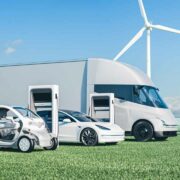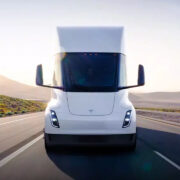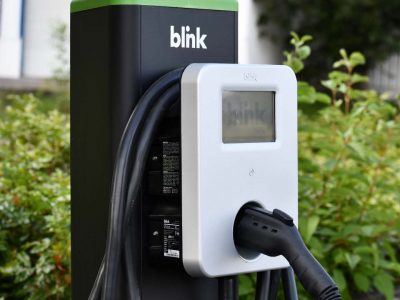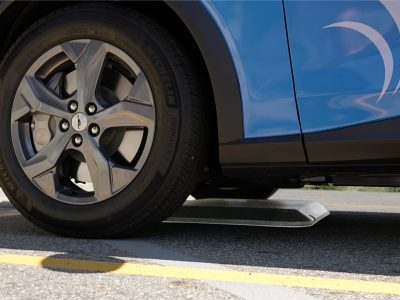The Tesla Model Y has started deliveries, but more EV SUVs and crossovers are coming. Like the Audi e-Tron Sportback and Q4 e-Tron. Byton M-Byte, Mazda MX-30, Nissan Ariya, Volvo XC40, BMW iX3, and Ford Mustang Mach-E. How will the Tesla Model Y hold up to the EV competition? Or … is that even the right question to be asking?
Several years ago I put down a deposit on a Tesla Model 3 because I wanted to get off of fossil fuels and do my part to help with the transition to electric transportation. It was a side benefit that the Model 3 is also an amazing car to drive. But I know that’s not true for everyone that buys a Tesla or any other EV. Some buy cars because they really like the way they look. Others because of how fast they are or the way they handle when driving them. Or if you’re able to fit all of your kids in the back seats. So when I was looking at how the Model Y might stack up to the competition, I realized that focusing only on EVs was probably a mistake.
Taking a step further back, I thought a good starting point and place for comparison was looking at the broader SUV and car market as a whole. I’m using the Model 3 as a gauge for how it stacks up to all other vehicles, EV or not, since we have a full quarter of sales numbers to work with.
A quick side note before I get into my take and projections. The state of the world right now has kind of turned everything upside down. Nobody knows at this point how car companies are going to be impacted by the forced shutdowns and slow down in sales. I’m not taking any of the uncertainty that’s going on into account for my analysis and comparisons, but it’s definitely going to have some kind of impact in the coming months. And on a personal note,I hope everyone is staying safe, staying healthy, and watching out for your friends and family. We’re all in this together … that said … let’s get into it.
Model 3 vs.
Let’s start by looking at the Q4 2019 numbers for all cars.1 The best selling car in the U.S. was the Toyota Camry (shocker) with 78,522 sold. The Tesla Model 3 came in 8th place with 47,275 cars sold, which beats out cars like the Nissan Sentra, Ford Fusion, VW Jetta, and BMW 3 Series. One interesting note about the top 20 best selling cars is that the prices mostly range from just under $20K to upper $20K, with an average starting price of $23,850. Only two cars have starting prices around $40,000, which are the Tesla Model 3 and BMW 3 Series. The fact a $40,000 car is so far up the list says a lot about the demand for the Model 3. Comparing the sales numbers, Tesla sold about 60.2% the number of Model 3s compared to the number one Toyota Camry.
So how does this help in looking at the Model Y and SUVs? Bear with me for a minute, since we need to set the stage with the SUV sales number first. The SUV and crossover market is much larger than the passenger car market. The number one selling SUV from Q4 of 2019 was the Toyota RAV4, which sold 123,446 vehicles with a starting price of about $26,000. The top 20 SUVs have an average starting price of about $28,359. Roughly $5,000 more than the average starting price of the top 20 cars. The Model Y is only selling the Long Range and Performance versions right now, with a starting price of $52,990, which is $4,000 more than the comparable Model 3. This fits right into the price variance between the car and SUV markets. We also saw that the Model 3 sold about 60.2% the amount of the number one selling car. If demand for the Model Y matches the Model 3, that gives us a similar 60.2% sales target from the number one selling SUV in the category. That means, using the Q4 2019 SUV numbers, Tesla could have sold about 74,000 Model Ys, putting them in 5th place on the top SUV list. Right behind the Toyota RAV4, Honda CR-V, Chevy Equinox, and Nissan Rogue.
To double check my logic there, if you look at all vehicles regardless of category, the Toyota RAV4 is #4. Toyota Camry is #7. And the Model 3 is #22. If you compare Toyota cars to Toyota SUVs, the Camry sells about 63.6% the number of RAV4s. So that’s the difference between car and SUV in the number one selling brand. Again, if we apply that percentage to Tesla, we would see the Tesla Model Y selling about 74,000 vehicles compared to the Model 3 at 47,000.
Back in the Q4 2018 earnings call, Elon said this about the SUV market and the Model Y:
“We expect the demand for Model Y will be maybe 50 percent higher than Model 3, could be even double. As I understand it, the midsize SUV segment worldwide is the most popular type of vehicle, so we’ll probably see a higher volume of Y than 3.” – Elon Musk2
Which also falls right in line with what I pointed out in the Q4 numbers.
But to go back to the original question about how the Model Y will hold up against the upcoming EV SUV competition specifically. There’s a pretty long list of EVs on the way in the next year or two.
To help understand where things might land for any of those EVs, I think we can look at what’s already on the market today as a guide. We have the Audi e-Tron starting at $75,000. The Hyundai Kona EV at $36,990. The Kia Niro EV at $38,500. The Jaguar I-PACE at $69,850. And the Tesla Model X at $84,990.
In Q4 of 2019 Audi sold about 1,829 e-Trons, which is clearly not a big seller. It’s the lowest selling Audi SUV on the market, including internal combustion engines, with the Audi Q8 selling about 3,972 in comparison. Or the top selling Audi, which is the Q5 with 18,380 vehicles. When it comes to the up-coming Sportback and Q4 e-Tron, I think we’re going to see more of the same. Good EVs that make for happy owners, but in much smaller numbers than their internal combustion engine variants.
Then there’s the odd Hyundai Kona with 826 sales in Q4, and Kia with 733 Niro EVs. These SUVs have been extremely popular and have long waiting lists, but Hyundai/Kia is struggling to produce them at volume. The low sales aren’t from a lack of demand. It’s perplexing that they aren’t ramping up given the demand, but to me it shows that if you build a good quality, affordable EV, people will wait for them.
Then there’s the Jaguar I-PACE at 752 sold. According to one report I found, the supplier of the electric drive system said the sluggish I-PACE sales are about half of what they expected.3
By comparison, the best selling SUV EV is the Tesla Model X at 5,500.4 So why is the most expensive SUV also the best selling in the group? I think it comes down to perceived value. The cheapest models are in high demand, but the companies are struggling with keeping up supply. The more expensive versions, while very refined, don’t match the range and user experience of the Model X. Basically, none of them are hitting on all of the essentials. They’re missing the mark on supply or on features and user experience, when the key is hitting on both.
That’s why on the list of upcoming EV SUVS, there’s three that I think are worth highlighting and putting up against the Model Y because they hit on price, mileage, styling, and possibly … perceived value.
Nissan Ariya – 2021 – $40,000 (expected)
Nissan has one of the best selling SUVs on the market today with the Rogue. My parents have one and absolutely love it. Nissan is not the new kid on the block when it comes to EVs, and even though the Nissan Leaf isn’t the best selling EV on the market, I think Nissan has a shot at delivering a very compelling SUV and an even better price. There aren’t a lot of details available yet for this one, but some are expecting it to have up to 300 miles of range.5 If this comes in at the prices that are expected, this is going to be a compelling competitor to the Model Y.
VW ID.4 – 2020 – $35,000 (expected)
Whatever you think about their motivation for going all-in on EVs, it really doesn’t matter. VW is doubling and tripling down on EVs, and coming out with a lot of really interesting options. They’re the company I’m most excited about in the EV space after Tesla, and the one that seems to have laid the groundwork better for the transition than anyone else. With plans to build 1.5 million EVs by 2025, that’s something to get excited about.6
VW is saying that the ID.4 should have up to 310 miles of range, which puts it squarely in the territory of the Model Y. Even if that is the more optimistic EU WLTP rating, so we can expect the EPA rating to be lower. It should also support fast charging, which will most likely be able to take advantage of networks like EV America. And size-wise it should be comparable to the Kona and Model Y.7
Ford Mustang Mach-E – 2020 – $44,995
Now, I’m going to admit that I’m a little biased here. I’m a fan of Ford. My parents owned several Fords when I was growing up. I owned a Ford Fusion Energi before my Tesla Model 3, and really loved that car. I did a full review of it a while back if you’re interested in watching it. And there’s a little national pride there, too. I want to see one of the oldest car companies in the U.S. make the transition to electric successfully. And I have to say that I really like what I’m seeing with the Ford Mustang Mach-E.
Unlike the previous two competitors, this one we know a lot more about. The base model will have a similar range to the standard range Model Y, when that one is available. Both will be around 230 miles. While it takes a much larger battery pack than the Y to achieve the same range, the owner ultimately won’t care as long as the price and value are the same. The styling is very Ford. It evokes a muscle car, which will speak to a segment of car buyers that don’t like Tesla’s design aesthetic.
Final thoughts
All three of those have the potential to strike a chord with buyers, offer competitive mileage for the dollar, and bring a lot of value. But given the track record with how current EV SUVs have fared, as well as how unproven some of these companies are at selling EVs at scale, I don’t think any of them will overtake the Model Y for the number one EV SUV anytime soon. That’s not to say they won’t sell well, because I think some of them will. There’s plenty of room in the market for several top selling EV SUVs out there.
Now while I think the Nissan, VW, and Ford EVs are the top 3 to keep an eye on as competitors to the Tesla Model Y, I really do think that’s the wrong way to look at it. In fact, I really wish places like the U.S. News car reports would stop categorizing EVs separately, like they need special treatment. I know it’s so companies can say things like, “we’re the best selling EV in the market,” but again … that’s not helpful. A good EV is a good car. Period. It should hold its own not just against other EVs, but other cars no matter the drivetrain. Tesla has been proving that EVs are competitive when you provide the right value to the customer, and we’ve seen a huge number of people trading up from Toyota Camrys to Tesla Model 3s, which is dramatically more expensive upfront. And that’s because the value is there. I think the Tesla Model Y is going to strike that same exact chord, which is why I think my Model Y’s 74,000 unit estimate based on the Q4 2019 numbers is conservative. It’s not only going to be the best selling Tesla, it’s going to be one of the best selling vehicles on the market. If I’m right, it’ll be in the top 10 best selling vehicles. That’s compared to everything … trucks, SUVs, and cars.
1: http://www.goodcarbadcar.net/2020-us-suv-sales-figures-by-model/
2: http://www.inverse.com/innovation/why-tesla-model-y-could-be-the-firms-most-high-demand-car-ever
4: http://insideevs.com/news/343998/monthly-plug-in-ev-sales-scorecard/
5: http://www.caranddriver.com/nissan/ariya
6: http://www.kbb.com/articles/car-news/2021-volkswagen-id-4-first-look/
7: http://www.caranddriver.com/volkswagen/id4 http://www.edmunds.com/volkswagen/id4/


















Comments